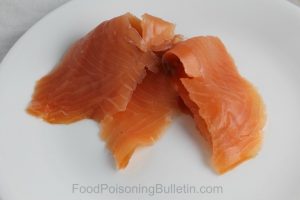A study by the Norwegian National Institute of Nutrition and Seafood Research has found that Listeria monocytogenes may be in that country’s salmon. A study of three companies that produce farmed salmon in various areas of that country identified fifteen types of the bacteria. Nine of the fifteen types were found in patients with listeriosis, the illness caused by Listeria monocytogenes bacteria. That study was published in the journal Epidemiology & Infection.
 NIFES scientist Bjørn Tore Lunestad said in a statement, “this background is not sufficient for us to claim that fish are the sources of the cases of listeriosis in our study. But on the other hand, we cannot ignore this possibility. Salmon are one of several potential sources of L. monocytogenes.” The MLVA profile of 07-07-09-10-06 was the most common strain in Norwegian listeriosis patients; this profile was also found in fish and in the processing environment, although no outbreaks of this particular strain have been linked to fish.
NIFES scientist Bjørn Tore Lunestad said in a statement, “this background is not sufficient for us to claim that fish are the sources of the cases of listeriosis in our study. But on the other hand, we cannot ignore this possibility. Salmon are one of several potential sources of L. monocytogenes.” The MLVA profile of 07-07-09-10-06 was the most common strain in Norwegian listeriosis patients; this profile was also found in fish and in the processing environment, although no outbreaks of this particular strain have been linked to fish.
In the US, public health officials warn those susceptible to listeriosis, including the very young, pregnant women, the elderly, and those with weakened immune systems, to avoid smoked salmon and other smoked meats, deli meats, soft cheese, sprouts, and raw milk because those items can be contaminated with Listeria bacteria.
Not many people in Norway contract listeriosis. In 2007, 21 people in that country were diagnosed with listeriosis, linked to cheese produced as a dairy farm. And in 2005, three cases were confirmed, linked to processed meat. In contrast, in the U.S., there were 1,651 cases of listeriosis diagnosed from 2009-2011.





How disgusting. Poor Norwegians.